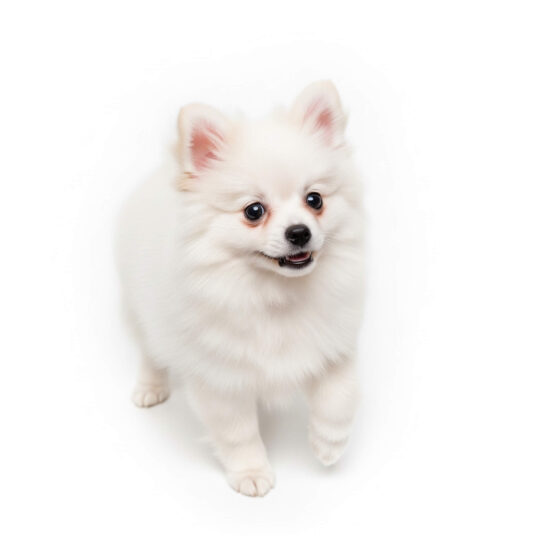Please create a free account, or login by clicking here.
Petland Bradenton, Florida
The Pomeranian, the smallest of the spitz family, descends from sled dogs in Lapland and Iceland, getting its name from regions in Poland and Germany where it was originally bred. Its popularity soared in the 1800s after being praised by Queen Victoria and was officially recognized by the AKC in 1888, remaining a top breed today.
Personality-wise, Pomeranians are described as fearless, loving, loyal, and caring, possessing tiny bodies but huge hearts. Their temperament is happy, warm, and sometimes a bit stubborn.
Discover more about our Pomeranian puppies for sale below!

The Pomeranian, the smallest dog of the spitz family, originated from much larger sled dogs in Lapland and Iceland. They get their name from the Pomerania region (parts of modern-day Poland and Germany), where they were bred down in size over centuries. Their popularity skyrocketed in the 1800s after Queen Victoria of England became a devoted fancier, actively breeding smaller specimens. The breed was officially recognized by the American Kennel Club (AKC) in 1888 and remains a top dog breed in the United States today.
Pomeranians are widely described as fearless, loving, loyal, and caring. Despite their very small stature, these feisty little dogs certainly don’t back down from anyone or anything! They possess tiny bodies but huge, loving hearts. For generations, this breed has consistently topped the charts of popular dogs and remains a favorite in the United States. Their temperament is best described as generally happy, warm, and sometimes a bit stubborn, adding to their unique charm.
The Pomeranian is renowned for its luxurious and very fluffy double coat, which stands off the body, giving them a round, almost ball-like appearance. What truly sets them apart in the dog world is their incredible variety of colors—they come in more than thirteen different shades! These range from light-colored cream to rich honeycomb, vibrant red, deep chocolate, and classic black, along with various striking variations and blends. Their distinct features also include an alert, foxy expression, small, erect ears, and a plumed tail that curls up and over their back.
Caring for a Pomeranian involves a few key areas to keep them happy and healthy. When it comes to feeding, providing quality dog food in the right amounts is crucial. Growing Pomeranian puppies need about 1.25 cups of food per 24-hour period. For mature Pomeranians, the recommendation is about 0.5 cups of food per pound of their body weight over a 24-hour period. Most experts suggest dividing their daily food intake into two portions, served about twelve hours apart.
Fact: The Pomeranian is a tiny dog that weighs less than fifteen pounds yet originates from a line of very large, strong, and physical dogs.
Fact: The Pomeranian has been spotted with some very famous people. These people include Mozart, Dr. Martin Luther King Jr., and Michelangelo, who allowed his Pomeranian to watch as he painted the ceiling of the Sistine Chapel!
Fact: This breed is known to be very loyal to his family, especially children.
Pomeranians are known for being fearless, lively, intelligent, and very loyal. Despite their small size, they have big personalities, often happy, warm, and a bit stubborn.
Pomeranians are toy breed dogs, typically weighing between 3 to 7 pounds (1.4 to 3.2 kg) and standing about 6 to 7 inches (15 to 18 cm) tall at the shoulder.
Yes, Pomeranians tend to be quite vocal. They are alert and often bark at new sounds, strangers, or when excited, making them good little watchdogs.
Pomeranians require significant grooming due to their thick, fluffy double coat. Daily brushing is essential to prevent mats, along with weekly baths, and routine nail clipping and teeth cleaning.
No, Pomeranians are not considered hypoallergenic. They have a double coat and do shed, especially seasonally, despite their small size.
Pomeranians generally have a long lifespan, typically ranging from 12 to 16 years, with many living even longer with proper care.
While charming, their vocal nature, grooming needs, and sometimes stubborn personality might be a bit challenging for first-time owners. They do best with owners who can commit to consistent training and care.
Yes, their small size makes Pomeranians highly adaptable to apartment living. However, their tendency to bark means proper training is important for harmonious living with neighbors.
Pomeranians can be prone to certain health issues, including luxating patella (slipping kneecaps), tracheal collapse, dental disease, alopecia X (black skin disease), and hypoglycemia (low blood sugar, especially in puppies).
Pomeranians have moderate exercise needs. Short daily walks (15-20 minutes) combined with indoor playtime are usually sufficient to keep them physically and mentally stimulated.
Fill out the below form and we'll get back to you as soon as possible. Thanks!
"*" indicates required fields